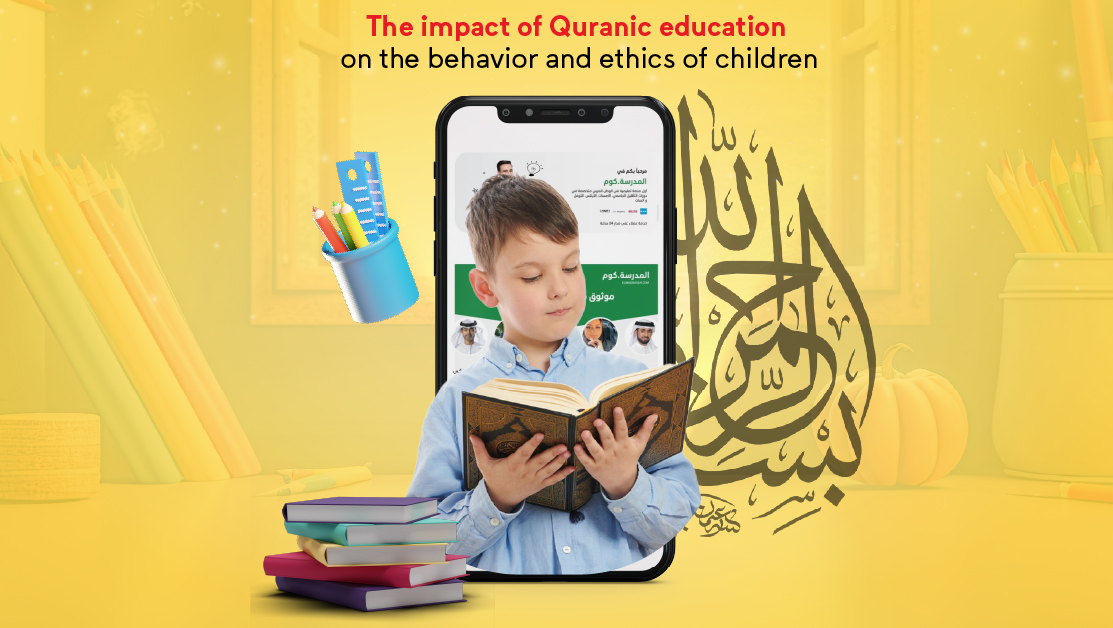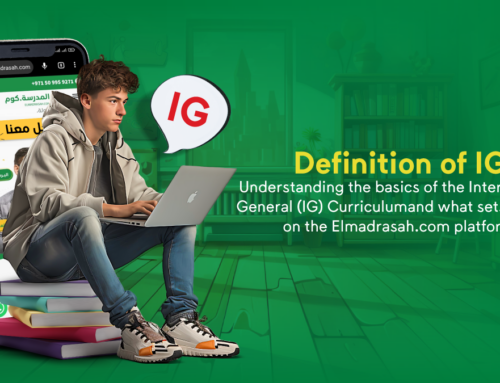
Child rearing and their character development are crucial aspects that form the foundation for their comprehensive growth and proper formation within society. Among the factors contributing to shaping their personalities and influencing their behavior and ethics positively, the teaching of the Holy Quran holds a prominent place. Learning the Quran and understanding its contents is not merely a religious act but also an educational process that significantly impacts the formation of character and the development of behavior and ethics in children.
This article aims to explore The impact of Quranic education on the behavior and ethics of children, and how it shapes their personalities and directs their actions towards goodness and positivity. We will focus on the educational and psychological aspects resulting from Quranic learning, and how The impact of Quranic education influences the development of morals and behavior in children at various stages of their growth. Additionally, we will review research and studies shedding light on this aspect, and provide practical examples of applying Quranic teachings in children’s lives and the positive impact of The impact of Quranic education on shaping their behavior and ethics.
Teaching the Quran and shaping children’s moral values
In a world full of ethical challenges and social temptations, teaching the Holy Quran is a fundamental basis for building children’s characters and shaping their moral values. It is not merely learning words and rulings; rather, it is a guiding light illuminating life’s paths and a compass directing their behavior and actions. The Quran is considered the optimal method for educating new generations on noble values and ethics.
- Building an ethical foundation: The impact of Quranic education contributes to building a strong foundation of moral values in children’s souls. It teaches them concepts of truthfulness, justice, mercy, tolerance, humility, and other noble values that form the basis for a distinguished personality and positive behavior.
- Developing religious awareness: Through studying the Quran and understanding its meanings, children grow in religious and spiritual awareness. They gain a deep understanding of principles of faith and worship, making them more upright and closer to God.
- Encouraging giving and cooperation: The Quran encourages giving, helping others, and cooperating in goodness and righteousness. By teaching these values, children learn the importance of serving the community and contributing to improving others’ lives.
- Promoting respect and tolerance: The impact of Quranic education teaches children the importance of respecting others and dealing with them with tolerance and kindness. They learn how to coexist with individuals from different backgrounds and respect the diversity of opinions and cultures.
- Building positive character: Learning the Quran helps in building balanced positive personalities. Children become more aware of their actions and behaviors, learning to control their reactions and guide them in accordance with Quranic teachings.
- Achieving balance and discipline: The Quran teaches children the art of balance between worldly life and the Hereafter, and between materialism and spirituality. It helps them prioritize aspects of their lives and achieve balance between its various facets.
Teaching the Quran is more than just a religious activity; it is an investment in the future of generations to come. It is a comprehensive educational process that positively impacts children’s development, spiritual growth, and ethics, contributing to building a better society with higher values and morals.
How does learning the Quran affect the development of children’s morals?
Teaching the Holy Quran is considered one of the most important elements of education in Islamic culture, as it carries many values and principles that contribute to shaping children’s character and developing their morals. Learning the Quran is not just studying religious texts; it is a comprehensive educational process that positively influences children’s behavior and enhances their moral values. In this article, we will explore how learning the Quran affects the development of children’s morals.
- Building religious awareness: Learning the Quran contributes to building a strong religious awareness in children, as they become acquainted with concepts of faith, piety, and worship through it. Children learn values of truthfulness, justice, humility, and tolerance from the Quran, which helps them understand religion more deeply and apply its teachings in their daily lives.
- Promoting humanitarian ethics: The Quran encourages goodness, righteousness, and kindness towards others, contributing to the development of noble humanitarian values in children. Through the stories and teachings found in the Quran, they learn the importance of helping the poor and needy and treating others with kindness and compassion.
- Encouraging ethical reflection: Quranic verses prompt children to engage in ethical reflection and contemplation, developing their ability to make sound decisions based on noble ethical values. Through The impact of Quranic education , children learn the importance of justice, honesty, and integrity in all aspects of their lives.
- Fostering positive behavior: Learning the Quran motivates children to adopt positive behavior characterized by discipline and adherence to virtuous morals. They learn the importance of patience, forgiveness, and dedication to work, helping them develop strong and tolerant personalities.
- Promoting social values: The teachings of the Quran support positive social values such as cooperation, solidarity, and respect for others. Children learn from the Quran the importance of building interconnected and cooperative communities based on noble ethics.
In summary, learning the Quran is a fundamental factor in developing children’s morals, as it contributes to building their characters and shaping their behavior in line with the values and principles of the Islamic religion. Parents and teachers should encourage children to learn and understand the Quran, as it will be a valuable investment in their future and moral development.
How does learning the Quran contribute to building responsible and benevolent personalities in children?
In a world full of challenges and rapid changes, parents are always looking for ways to build their children’s characters and improve their behavior towards goodness and positivity. Among the most important of these ways is teaching the Holy Quran, as one of the key factors contributing to building children’s characters and making them responsible and benevolent. So how can learning the Quran influence the construction of these personalities? Let’s find out.
Learning the Quran and promoting moral values:
Reciting the Quran and understanding its meanings are among the most important factors contributing to the development of children’s moral values. The Holy Quran contains many stories and teachings that highlight values such as truthfulness, justice, humility, and tolerance. By understanding and contemplating these values, children can build their moral capabilities and apply them in their daily lives.
Developing spiritual awareness:
Learning the Quran contributes to the development of spiritual awareness in children, as they become acquainted with important religious and spiritual concepts such as faith in God, reliance on Him, patience, and gratitude. Through this awareness, children learn the value of charitable work and giving, making them more caring and compassionate towards others.
Enhancing awareness of responsibility:
Learning the Quran enhances children’s awareness of responsibility, as they realize that they are accountable to God and society for their actions and behaviors. Through Quranic lessons, children learn the importance of doing good deeds and avoiding sins, encouraging them to make correct and responsible decisions in their lives.
Encouraging volunteer and positive work:
Learning the Quran encourages children to engage in volunteer and positive work, as they are influenced by the noble humanitarian values promoted by the Quran, such as helping the poor and needy, visiting the sick, and caring for neighbors and relatives. By promoting these values, children become individuals who strive to help others and serve the community with love and sincerity.
Fostering positive personalities:
Learning the Quran helps build positive personalities in children, as they learn ethical rules and virtuous behaviors that make them individuals who love goodness and contribute to building their communities. In this way, they become role models and examples to be followed in society.
In summary, it appears that learning the Quran plays an important role in building responsible and benevolent personalities in children, as it contributes to the development of their moral values, encourages them to engage in good and positive actions, and enhances their positive and responsible personalities in society. Therefore, parents and teachers should pay attention to teaching the Quran to children and encourage them to understand and apply its teachings.
Impact of The impact of Quranic education on Developing Arabic Language Skills in Children
Learning the Quran is among the foremost factors contributing to the development of Arabic language skills in children, as the Holy Quran represents a foundational text in Arabic and serves as a primary source for its grammatical and morphological rules. Therefore, learning the Quran has a positive effect on children’s understanding and usage of the language. Here are some points highlighting this impact of The impact of Quranic education :
- Expanding Arabic vocabulary: Quranic verses encompass a wide range of diverse Arabic vocabulary, which contributes to enriching children’s vocabulary and naturally expanding their linguistic repertoire as they learn the Quran.
- Enhancing reading skills: Reciting the Quran requires concentration and careful interpretation of the text, which enhances children’s reading skills across various age levels.
- Improving listening and comprehension: When children listen to the recitation and interpretation of the Quran, they learn how to better understand linguistic texts and extract meanings from context.
- Developing grammatical and morphological rules: The Quran contains numerous exemplary examples of Arabic grammatical and morphological rules, contributing to enhancing children’s understanding of these rules and their application in writing and speaking the language.
- Encouraging writing and expression: Learning the Quran may influence children’s ability to write Arabic texts and express themselves clearly, as they are inspired by its beautiful linguistic styles and profound expressive techniques.
In summary, learning the Quran represents a rich and effective resource for developing Arabic language skills in children, whether through expanding vocabulary, improving reading skills, developing comprehension and expression, or enhancing understanding of grammatical and morphological rules.
Encouraging Children’s Love for the Quran through Creative and Interactive Activities
Encouraging children to love the Quran requires using innovative and enjoyable teaching methods to make the Quran learning experience exciting and interactive. Through creative and interactive activities, the emotional connection of children with the Quran can be strengthened, and their understanding and love for it can be enhanced. Here are some ideas to encourage children’s love for the Quran through creative and interactive activities:
- Illustrated Quranic stories: Using illustrated stories derived from the Quran is a fun and engaging way for children to discover the stories of the prophets and Quranic events. Children can experience colorful illustrations and exciting stories that make the Quran more realistic and inspiring for them.
- The impact of Quranic educational games: Developing educational games focusing on the Quran, such as memory games containing Quranic verses or crossword puzzles based on Quranic vocabulary, enhances children’s understanding of Quranic texts in a fun and interactive way.
- Quranic art activities: Encouraging children to create artwork inspired by the Quran, such as drawing, sculpting, or handicrafts. These creative activities can enhance the expression of understanding and feelings towards the Quran and deepen the connection with it.
- Quranic competitions and games: Organizing Quranic competitions such as recitation competitions or Quran memorization competitions can be an opportunity to motivate children and enhance their desire to excel in Quran learning. Interactive online games with questions and challenges about the Quran can also be designed.
- Quranic plays and role-playing: Organizing small Quranic plays in which children can participate and embody various Quranic characters. These Quranic roles help children better understand Quranic stories and the personal identities of the characters in them.
Using these creative and interactive activities, children’s love for the Quran can be enhanced, and they can be encouraged to explore and understand Quranic texts in an inspiring and enjoyable way.
Impact of The impact of Quranic education on Self-Confidence and Religious Belonging in Children
Raising children to learn the Holy Quran has a significant impact on shaping their personalities and positively developing them. The Quran is not just a religious book but a guide for human life, a source of inspiration, and guidance. In this article, we will explore The impact of Quranic education on fostering self-confidence and religious belonging in children.
Boosting Self-Confidence:
Learning the Quran provides a positive environment for developing self-confidence in children through several mechanisms:
- Developing faith-based skills: Children learn from the Quran stories about prophets and righteous individuals and how they overcame challenges with confidence in Allah and themselves. This inspires children and encourages them to rely on their abilities and develop them.
- Encouraging diligence: Through learning the Quran, children discover themselves speaking to Allah when reciting the Quran and pondering its meanings. This interaction enhances their sense of pride and self-confidence.
- Feeling acceptance and love: The impact of Quranic education shows children that they are accepted and loved in the religious community, enhancing their confidence and religious belonging.
Enhancing Religious Belonging:
Learning the Quran encourages religious belonging in children through:
- Awareness of Islamic identity: By studying the Quran, children learn about Islamic values and teachings, enhancing their understanding and belonging to the religion and Islamic society.
- Strengthening social bonds: Children participate in study circles and community activities related to Quranic learning, which enhances their religious belonging through interaction with others who share the same values and interests.
- Connection to traditions and history: The Quran presents children with narratives about the history and traditions of Islam, enhancing their religious belonging and making them proud to adhere to this great heritage.
In summary, learning the Quran shows a positive impact on developing self-confidence and religious belonging in children, as it enhances their pride in their Islamic identity and encourages them to develop their abilities and participate in the religious community with confidence and faith.
Challenges and Difficulties of Quranic Learning for Children and How to Overcome Them
Learning the Quran for children is an important and rewarding experience, but it may face some challenges and difficulties that parents and teachers need to address wisely. In this article, we will discuss some of these challenges and difficulties and ways to overcome them:
Busy with daily activities:
Children in the current age face many activities such as studying and extracurricular activities, making it difficult to allocate sufficient time for Quranic learning.
- Overcoming: Encourage setting a specific daily schedule for Quranic learning, and parents and teachers should emphasize the importance of Quranic learning and prioritize it over other activities.
Difficulty in focus and attention:
Due to the application of technology and electronic distractions, children may find it challenging to focus on Quranic learning for extended periods.
- Overcoming: Lessons should be delivered in interactive and engaging ways, and innovative teaching materials such as games and competitions should be used to make Quranic learning more enjoyable and exciting.
Technical and linguistic difficulties:
Children may face difficulties in understanding some religious concepts or reading Arabic text.
- Overcoming: Concepts should be presented in a simple and clear manner, and stories and situations that children can easily recognize and understand should be used. Additionally, diverse educational materials in various languages should be provided for non-Arabic speaking children.
Feeling boredom and repetition:
Repeated recitation and memorization may lead to feelings of boredom in children.
- Overcoming: Encourage diversifying activities and educational materials, and introduce new and interesting challenges for children, such as learning to recite a new Surah or participating in Quran memorization competitions.
Lack of motivation and support:
Some children may feel a lack of motivation and support from parents or teachers, affecting their desire to learn the Quran.
- Overcoming: Parents and teachers should provide continuous support and encouragement to children, and offer appropriate rewards and incentives to enhance their love and interest in learning the Quran.
In conclusion, learning the Quran for children faces some challenges and difficulties, but with the use of appropriate strategies and providing necessary support, children can overcome them and achieve greater success and effectiveness in learning and memorizing the Quran.
The impact of Quranic education Courses for Children with elmadrasah.com Platform
elmadrasah.com platform is one of the leading online educational environments that offers The impact of Quranic education courses for children in an effective and innovative manner. This platform serves as a vital resource for parents seeking to teach their children the Quran in a motivating and inspiring way. In this article, we will take a close look at The impact of Quranic education courses for children with the elmadrasah.com platform and how they contribute to achieving educational and spiritual goals for children.
- Innovative and Interactive Quran Learning: The impact of Quranic education courses for children on the elmadrasah.com platform stand out with an interactive and innovative approach that captures children’s attention and motivates them to learn. The platform offers diverse
- educational content, including instructional videos, interactive activities, and short quizzes to assess progress.
- Qualified and Specialized Instructors: The instructors of The impact of Quranic education courses on the elmadrasah.com platform have high expertise and proficiency in teaching the Quran to children. They are carefully selected to ensure the delivery of an excellent educational experience for children that aligns with their needs and abilities.
- Progress Monitoring and Feedback: The elmadrasah.com platform provides tools for monitoring children’s progress in Quranic learning, including tracking attended lessons and conducted quizzes. Necessary feedback and guidance are also provided to students to help them improve their performance.
- Flexibility in Schedule and Content Access: The elmadrasah.com platform offers great flexibility for children and parents, allowing access to Quranic learning courses anytime and from anywhere thanks to the user-friendly digital interface.
- Safe and Supportive Learning Environment: The elmadrasah.com platform provides a safe and supportive learning environment that encourages children to learn and enjoy The impact of Quranic education . Children have the opportunity to interact with their peers and share experiences and ideas.
In summary, The impact of Quranic education courses for children with the elmadrasah.com platform offer an ideal opportunity to achieve effective and enjoyable learning for children in a safe and motivating environment. The platform offers innovative and diverse teaching methods that help children successfully achieve their educational and spiritual goals.
In conclusion, it is clear that The impact of Quranic education has a profound impact on Improving Child Behavior and ethics. It is not just about learning religious texts but also a formative process for character and values. With its noble messages and ethical values, The impact of Quranic education helps children develop positive traits such as tolerance, compassion, and moderation.
When children receive Quranic lessons in an organized manner and through a motivating curriculum, they learn not only how to recite words but also how to apply its teachings in their daily lives. The Quran encourages justice, kindness, and tolerance, and it promotes building positive relationships with others and enhancing peace in society.
Therefore, let us all work together to promote The impact of Quranic education for children and be living examples for them in applying its principles in our daily lives, to collectively achieve a positive transformation inImproving Child Behavior and ethics of future generations.















